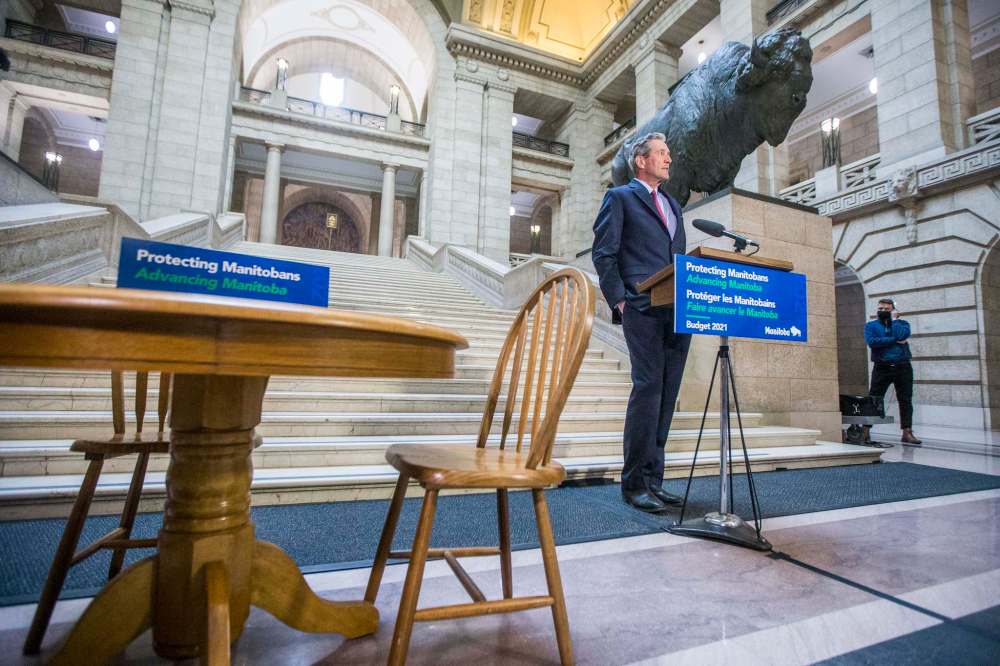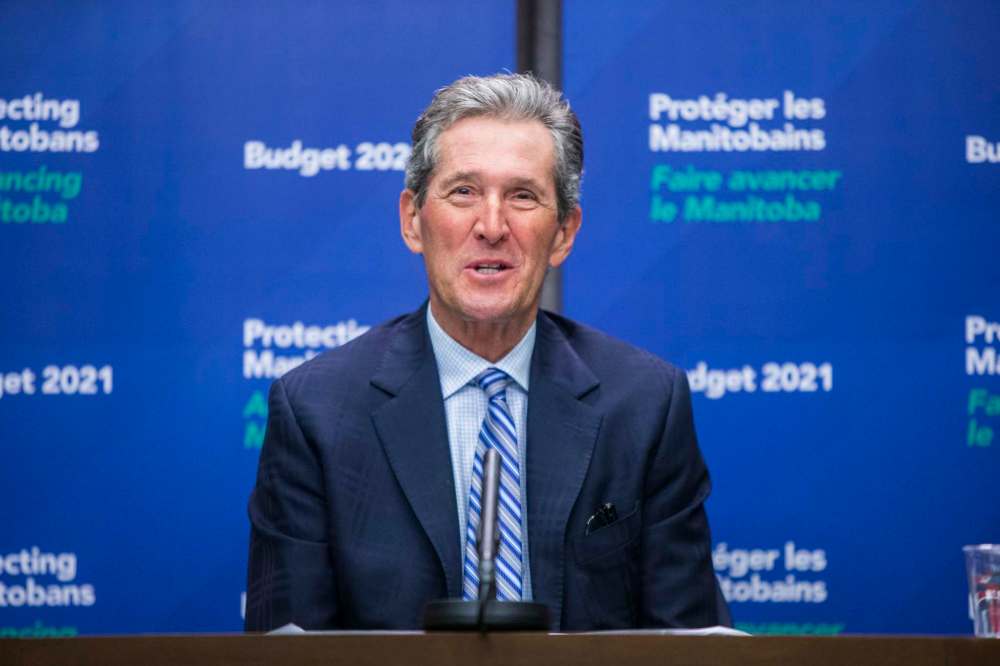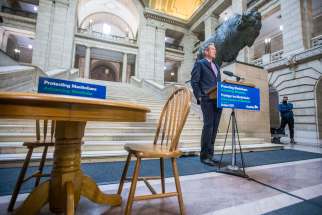Selling illusion of tax cuts amidst real public health crisis
Read this article for free:
or
Already have an account? Log in here »
To continue reading, please subscribe:
Monthly Digital Subscription
$1 per week for 24 weeks*
- Enjoy unlimited reading on winnipegfreepress.com
- Read the E-Edition, our digital replica newspaper
- Access News Break, our award-winning app
- Play interactive puzzles
*Billed as $4 plus GST every four weeks. Offer only available to new and qualified returning subscribers. Cancel any time.
Read unlimited articles for free today:
or
Already have an account? Log in here »
Hey there, time traveller!
This article was published 01/04/2021 (1401 days ago), so information in it may no longer be current.
And so it was that, on April Fools’ Day, with the province facing the threat of a third wave of COVID-19 and poll results suggesting he may have crippled his party’s chances at re-election, Premier Pallister offered Manitobans the promise of additional tax cuts.
You heard that right.
The premier summoned reporters to a Thursday news conference on the grand staircase of the Manitoba Legislative Building to announce he would start eliminating the education portion of property taxes this year, in defiance of the pandemic and regardless of its impact on the provincial treasury or core services.

With all his Tory government, and the people of Manitoba, are facing, it’s hard to figure out what reaction Pallister had hoped for. Depending on where you were at the exact moment he was facing reporters, the reaction likely ranged from astonished to outraged.
Imagine, if you will, the news of Pallister’s tax-cut proposal reaching the legions of elderly Manitobans who are being forced to line up for hours at the Winnipeg convention centre vaccination “super site” like Black Friday bargain hunters in search of a great deal on a big-screen television.
For those unlucky seniors, and for all Manitobans who have suffered at the hands of this government’s thrifty pandemic response, the promise of a tax cut is more than a cruel prank; it is ultimate in tone-deaf politics.

It’s not even clear, given current fiscal conditions, the premier can even pull this off.
First pitched in the 2019 election, Pallister’s idea of saving property owners an average of $2,000 per year was a truly excellent bit of campaigning. But it comes with a hefty price tag.
The Tories estimated it would take approximately 10 years to fully eliminate the education portion of property taxes, which generates more than $800 million annually to support the public school system. If evenly spaced out, that would require Manitoba to find an additional $80 million each year.
It’s important to note Pallister promised this tax cut would be funded by reductions in expenditure — not by increases in other taxes.
If the budget were in a modest surplus, it’s theoretical it could have absorbed the annual hit within the growth of own-source revenues. However, with the budget in deficit for the foreseeable future, it will have to rely solely on cutting expenditures, possibly within the education system.
That’s going to be tough, given what Pallister has done over the last five years: essentially freezing education funding by providing annual increases well below the combined impacts of inflation and population growth.
With a deficit hanging around his neck, and sluggish economic conditions, it would be hard to imagine Pallister could find “savings” of that magnitude without doing significant damage to core services.
Of course, as he repeatedly demonstrated, it is a risk the premier is willing to take.

From Manitoba Hydro to the health-care system and grants to municipalities, Pallister strangled expenditures with an unwavering faith government could absorb whatever austerity he deemed necessary. The result is a government that is less, both in quantity and quality.
The COVID-19 response is a good case in point. Pallister claimed Manitoba has the second-most generous pandemic support programs in the country. And while Manitoba’s efforts are comparable to most other provinces, he conveniently leaves out the state of its response.
Manitoba’s testing system was an abject failure; its contact tracing program a disaster. In the health-care system, there have been shortfalls in PPE, along with staffing shortages in personal care homes and hospitals.
In the grips of the greatest public health crisis in more than a century, Pallister has applied a dollar-store strategy: find the least amount of anything, at the lowest cost possible, and keep your fingers crossed nobody notices.
Pallister’s political brand is built on his ability to maintain the illusion he can lower taxes by reducing expenditures without any discernible impact on government services.
Early this week, Pallister promised $50 million to address the priority surgery backlog that has been created during the pandemic. A positive development on the surface, until you realize Manitoba is way behind other provinces in this kind of funding.
British Columbia, for example, announced in May 2020 it would spend nearly $190 million to catch up on 32,400 non-urgent surgeries postponed because of COVID-19. Last month, B.C. announced it had already reduced its shortfall by 95 per cent.
Pallister’s political brand is built on his ability to maintain the illusion he can lower taxes by reducing expenditures without any discernible impact on government services. It’s a sleight-of-hand that worked to perfection in the 2016 and 2019 provincial elections.
That was then. And now Manitobans have seen the consequences of his conjurations.
As he forges on boldly in pursuit of yet another measure to shrink the capacity of government, Pallister should remember while everyone likes a tax cut, most are sensible enough to know there is a time and a place for it.
This is neither.
dan.lett@freepress.mb.ca

Dan Lett
Columnist
Born and raised in and around Toronto, Dan Lett came to Winnipeg in 1986, less than a year out of journalism school with a lifelong dream to be a newspaper reporter.
Our newsroom depends on a growing audience of readers to power our journalism. If you are not a paid reader, please consider becoming a subscriber.
Our newsroom depends on its audience of readers to power our journalism. Thank you for your support.
History
Updated on Thursday, April 1, 2021 8:04 PM CDT: Fixes word order in sentence.










